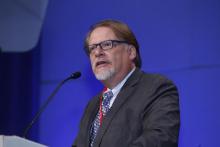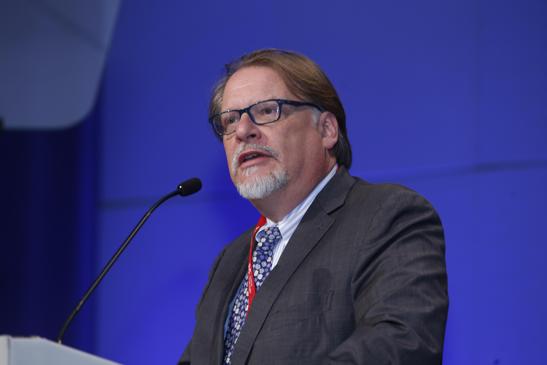User login
Rather than choosing a technical issue to address, “I feel it is much more important for us to know the mechanisms of payment systems and how the new world order is going to transpire,” said R. Clement Darling, III, MD, in his introduction to the 2017 E. Stanley Crawford Critical Issues Forum.
Each year, the Vascular Annual Meeting is highlighted by the Forum, which is moderated and organized by the incoming SVS president. This year, Dr. Darling, of the Albany Medical College, assembled four speakers from a variety of disciplines to address “How to Navigate a Value-Based Reimbursement System: What You Need to Know.”
Michael C. Dalsing, MD, of the Indiana University School of Medicine discussed what vascular specialists needed to know about MACRA (Medicare Access and CHIP Reauthorization Act), and how to “compete and flourish” in a world of alternative payment systems. He pointed out that whatever happens to the Affordable Care Act in Washington, MACRA is here to stay because it replaces the former Sustainable Growth Rate (SGR), and deals with “how” to pay, not “who” pays. Physicians will have to be involved with either a MIPS (Merit-based Incentive Payment System) or an APM (Alternative Payment Model) in order to benefit. Those who do nothing will see a 4% decrease in 2019.
Daniel Gorin, MD, of Hyannis, Mass., addressed the issue of fitting the outpatient angio suite into the new world order. He said that it is not just a matter of how to deliver appropriate care and ensure that the right patients are operated on for the right reasons, but also to make sure that outpatient endovascular centers received appropriate accreditation, as they are here to stay and are very popular with patients. He pointed out that accreditation is only mandated in 30 states, but that even those states have few standards regarding that accreditation. He said that proper patient care will need to rely on the development of evidence-based care guidelines developed for patients in angio suites and for valid organizations, such as the Outpatient Endovascular Interventional Society, to be placed in charge of that accreditation.
John (Jeb) Hallett, MD, discussed the role of outcome registries in the future of vascular specialists now and in the future. He talked about whether they should be seen as necessary evils or useful tools. “What we measure is what we can change,” said Dr. Hallett*, pointing out that this is important in the new world of value-based care, where by 2022, “A+” physicians will receive a 9% increase in compensation, whereas the “F” performers will get a 9% decrease.
Finishing up the program, Anton Sidawy, MD, of George Washington University, addressed the overarching issue of regionalization and center accreditation, and how the continuous quality model can be applied to vascular medicine. One of the most important issues is how to make sure that vascular surgeons are proactive in taking control of the quality development and assurance process rather than having it taken over by other groups such as the government, insurers, or patient advocacy groups. He discussed how SVS is in preliminary discussion with the American College of Surgeons, which has developed many of these groups successfully with other professional societies, in order to create a potential new model for the vascular specialty. “Reforms need realistic input, which is best gotten from experts in the field. That’s us. So we need to be involved and participate in the process. Payment for physician services is moving from fee for service to payment for value, quality and efficiency, and we need to define value. This is one way to do it,” Dr. Sidawy concluded.
*Correction, 6/2/17. An earlier version of the article misattributed this quote.
Rather than choosing a technical issue to address, “I feel it is much more important for us to know the mechanisms of payment systems and how the new world order is going to transpire,” said R. Clement Darling, III, MD, in his introduction to the 2017 E. Stanley Crawford Critical Issues Forum.
Each year, the Vascular Annual Meeting is highlighted by the Forum, which is moderated and organized by the incoming SVS president. This year, Dr. Darling, of the Albany Medical College, assembled four speakers from a variety of disciplines to address “How to Navigate a Value-Based Reimbursement System: What You Need to Know.”
Michael C. Dalsing, MD, of the Indiana University School of Medicine discussed what vascular specialists needed to know about MACRA (Medicare Access and CHIP Reauthorization Act), and how to “compete and flourish” in a world of alternative payment systems. He pointed out that whatever happens to the Affordable Care Act in Washington, MACRA is here to stay because it replaces the former Sustainable Growth Rate (SGR), and deals with “how” to pay, not “who” pays. Physicians will have to be involved with either a MIPS (Merit-based Incentive Payment System) or an APM (Alternative Payment Model) in order to benefit. Those who do nothing will see a 4% decrease in 2019.
Daniel Gorin, MD, of Hyannis, Mass., addressed the issue of fitting the outpatient angio suite into the new world order. He said that it is not just a matter of how to deliver appropriate care and ensure that the right patients are operated on for the right reasons, but also to make sure that outpatient endovascular centers received appropriate accreditation, as they are here to stay and are very popular with patients. He pointed out that accreditation is only mandated in 30 states, but that even those states have few standards regarding that accreditation. He said that proper patient care will need to rely on the development of evidence-based care guidelines developed for patients in angio suites and for valid organizations, such as the Outpatient Endovascular Interventional Society, to be placed in charge of that accreditation.
John (Jeb) Hallett, MD, discussed the role of outcome registries in the future of vascular specialists now and in the future. He talked about whether they should be seen as necessary evils or useful tools. “What we measure is what we can change,” said Dr. Hallett*, pointing out that this is important in the new world of value-based care, where by 2022, “A+” physicians will receive a 9% increase in compensation, whereas the “F” performers will get a 9% decrease.
Finishing up the program, Anton Sidawy, MD, of George Washington University, addressed the overarching issue of regionalization and center accreditation, and how the continuous quality model can be applied to vascular medicine. One of the most important issues is how to make sure that vascular surgeons are proactive in taking control of the quality development and assurance process rather than having it taken over by other groups such as the government, insurers, or patient advocacy groups. He discussed how SVS is in preliminary discussion with the American College of Surgeons, which has developed many of these groups successfully with other professional societies, in order to create a potential new model for the vascular specialty. “Reforms need realistic input, which is best gotten from experts in the field. That’s us. So we need to be involved and participate in the process. Payment for physician services is moving from fee for service to payment for value, quality and efficiency, and we need to define value. This is one way to do it,” Dr. Sidawy concluded.
*Correction, 6/2/17. An earlier version of the article misattributed this quote.
Rather than choosing a technical issue to address, “I feel it is much more important for us to know the mechanisms of payment systems and how the new world order is going to transpire,” said R. Clement Darling, III, MD, in his introduction to the 2017 E. Stanley Crawford Critical Issues Forum.
Each year, the Vascular Annual Meeting is highlighted by the Forum, which is moderated and organized by the incoming SVS president. This year, Dr. Darling, of the Albany Medical College, assembled four speakers from a variety of disciplines to address “How to Navigate a Value-Based Reimbursement System: What You Need to Know.”
Michael C. Dalsing, MD, of the Indiana University School of Medicine discussed what vascular specialists needed to know about MACRA (Medicare Access and CHIP Reauthorization Act), and how to “compete and flourish” in a world of alternative payment systems. He pointed out that whatever happens to the Affordable Care Act in Washington, MACRA is here to stay because it replaces the former Sustainable Growth Rate (SGR), and deals with “how” to pay, not “who” pays. Physicians will have to be involved with either a MIPS (Merit-based Incentive Payment System) or an APM (Alternative Payment Model) in order to benefit. Those who do nothing will see a 4% decrease in 2019.
Daniel Gorin, MD, of Hyannis, Mass., addressed the issue of fitting the outpatient angio suite into the new world order. He said that it is not just a matter of how to deliver appropriate care and ensure that the right patients are operated on for the right reasons, but also to make sure that outpatient endovascular centers received appropriate accreditation, as they are here to stay and are very popular with patients. He pointed out that accreditation is only mandated in 30 states, but that even those states have few standards regarding that accreditation. He said that proper patient care will need to rely on the development of evidence-based care guidelines developed for patients in angio suites and for valid organizations, such as the Outpatient Endovascular Interventional Society, to be placed in charge of that accreditation.
John (Jeb) Hallett, MD, discussed the role of outcome registries in the future of vascular specialists now and in the future. He talked about whether they should be seen as necessary evils or useful tools. “What we measure is what we can change,” said Dr. Hallett*, pointing out that this is important in the new world of value-based care, where by 2022, “A+” physicians will receive a 9% increase in compensation, whereas the “F” performers will get a 9% decrease.
Finishing up the program, Anton Sidawy, MD, of George Washington University, addressed the overarching issue of regionalization and center accreditation, and how the continuous quality model can be applied to vascular medicine. One of the most important issues is how to make sure that vascular surgeons are proactive in taking control of the quality development and assurance process rather than having it taken over by other groups such as the government, insurers, or patient advocacy groups. He discussed how SVS is in preliminary discussion with the American College of Surgeons, which has developed many of these groups successfully with other professional societies, in order to create a potential new model for the vascular specialty. “Reforms need realistic input, which is best gotten from experts in the field. That’s us. So we need to be involved and participate in the process. Payment for physician services is moving from fee for service to payment for value, quality and efficiency, and we need to define value. This is one way to do it,” Dr. Sidawy concluded.
*Correction, 6/2/17. An earlier version of the article misattributed this quote.

